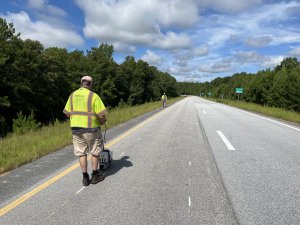
CAIT researchers testing their walking pavement profiler equipment.
Researchers at the Rutgers Asphalt Pavement Laboratory completed testing at the National Center for Asphalt Technology, and received a prestigious certification for International Roughness Index testing using multiple pavement profilers. This certification meets AASHTO standards and requirements. It also further validates equipment used in the lab and supports ongoing efforts at Rutgers to monitor and maintain New Jersey’s pavement network in partnership with NJDOT.
Earlier this year, CAIT researchers at the Rutgers Asphalt Pavement Lab drove their collection of pavement profiling equipment down to the National Center for Asphalt Technology (NCAT) at Auburn University, and passed a national certification for pavement network data collection— meeting AASHTO R56 requirements and comparing to other industry state-of-the-art tools.
NCAT is a leader in asphalt pavement technology that supports highway agencies and industry research. NCAT’s Test Track is the only high-speed, full-scale accelerated pavement testing facility in the world.

Different pavement profiling technologies and equipment that were tested on the NCAT Test Track.
Rutgers researchers, John Hencken, Michael Boxer and Richard Chui evaluated their walking and highspeed profilers on NCAT’s 1.7-mile oval track—which features test sections that allow for cutting-edge experimentation in a real-world laboratory environment.
“There are only a few actual certification locations nationwide, and NCAT is the premier place for contractors, DOTs, and pavement professionals to validate their equipment,” Boxer said. “Our reference device, a walking profiler, is used by New Jersey to collect pavement network data and measure smoothness on State roads. This was a great opportunity for the Rutgers Asphalt Pavement Lab to further validate our equipment, compare to industry state-of-the-art, and network with other leaders in the field.”
The Rutgers pavement lab works closely as a solution provider with the New Jersey Department of Transportation (NJDOT) through its Pavement Support Program—working on various tasks under the grant including verifying equipment and site locations used by the state to collect and analyze network pavement condition data.
Boxer said that all the Rutgers devices passed the NCAT inertial profiler certification process for international roughness index (IRI) testing, confirming that laboratory equipment is in good working order. The reference device, walking profiler, used by the State also had 98% accuracy during testing.
“Validating the accuracy of this equipment helps us advance NJDOT Pavement Support Program efforts by better maintaining a certification site to conduct pavement profile testing in New Jersey,” Boxer said. “This certification allows us to provide a more holistic and dynamic service to the pavement testing program.”
In passing the certification, the Rutgers devices also met requirements for the AASHTO R56 standard practice for Certification of Inertial Profiling Systems. R56 describes the performance requirements necessary for inertial profilers to be used for quality control of pavement surface smoothness.
The NCAT certification process applies AASHTO’s R56 industry standard, which includes procedures and requirements for test equipment used to measure a longitudinal surface elevation profile of highways and other roadways. The requirements are designed to focus on the need for accurate and repeatable profile measurements for construction quality control, quality assurance, acceptance and network-level data collection.
Getting to use the Test Track and see the other premier facilities and technologies at NCAT was a helpful and beneficial experience, the Rutgers research team said.
“It was nice just getting down there and meeting with leaders in the field, and seeing how they run and operate their equipment,” Boxer said. “As we continue with our research efforts here in New Jersey, this experience will help us grow and develop our testing program.”

